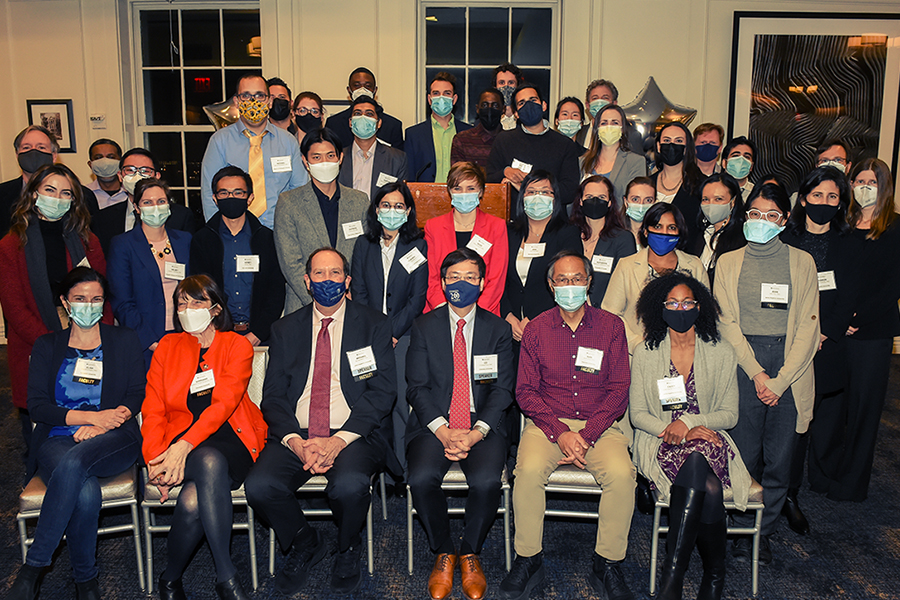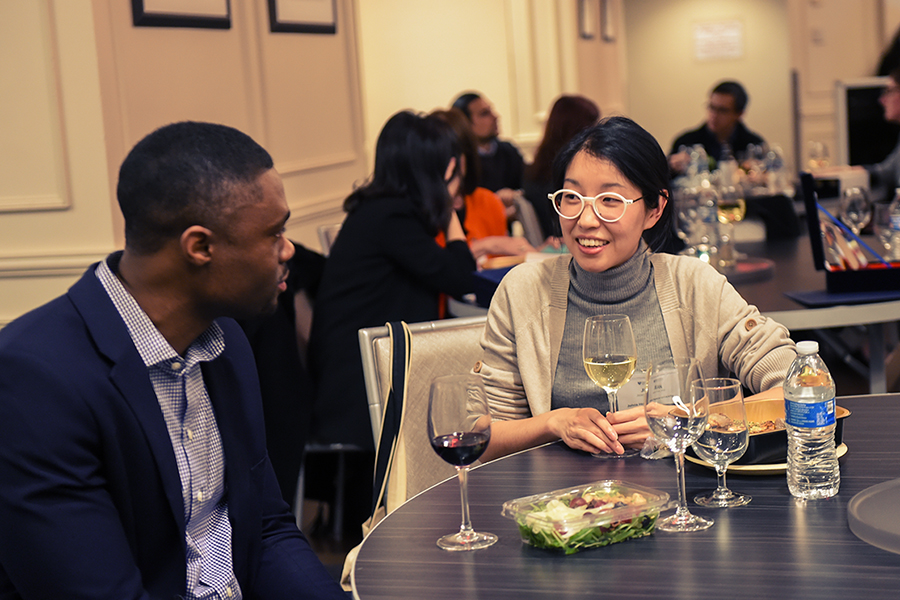I recently participated as a faculty member in Rising Stars in Engineering in Health Workshop co-hosted by Johns Hopkins University BME and Columbia University BME. The workshop provided rising star URM post-doctoral students with networking, faculty advice panels, mock interview sessions, as well as opportunities to give practice job talks and solicit feedback. One particularly session that I found very useful was on acing your academic job interview. Although the session was focused on faculty interviews, I found the tips quite applicable to graduate school interviews as well. So here are some of my notes from that session on the top 5 tips for acing your academic interview along with some of my own thoughts on these tips from an interviewer’s perspective. For those heading into this round of academic interviews, best of luck and have fun!
 (photo credit: Columbia BME)
(photo credit: Columbia BME)
Tip 1: Frame the discussion
As the interviewer, I am often the one framing the discussion that will take place during an interview. Framing involves the following components:
- task
- time
- topic
- rules
- roles
For me, the task of our discussion is to evaluate fit and I state this explicitly. Our time allotted for this discussion is typically specified beforehand, often around an hour. Given this time constraint, I will generally suggest starting the conversation by having the interviewee tell me about a research and/or extracurricular leadership experiences that I found interesting from their application, thereby setting the topic of discussion. I then tell the student about myself and our lab’s research, and conclude with sufficient time for the interviewee to ask any questions. For the open question component, I explicitly state the rules: that the interviewee is welcome to ask about anything from research to mentorship to life in Baltimore. I also explicitly state that my role is to be an open book so that I may provide the interviewee with the necessary information to make an informed decision.
As the interviewee, you can (if you like) play a role in framing your interview. The component that you will have the most control over is topic, which will likely involve your previous research and/or extracurricular leadership experiences The rest of the notes are centered around how to present on these previous research and/or extracurricular leadership experiences in an interview setting.
Tip 2: Start with why
This is a piece of advice taken from Simon Sinek’s book on the same name. When presenting on your research, it’s best to start with why. Why did you choose to research this question? Why is this question interesting? Why did you do this experiment (was it a negative or positive control)?
When presenting about their previous research experiences, many students focus on the “how” and the “what” e.g. how did they address a question and what specific tools they used. This may be reasonable if your interviewer is from the same field as you and likewise if you intend to continue in the same research field in the next stage of your training. In such a situation, focusing on how you did single-cell RNA-sequencing and clustering analysis may demonstrate that you have already developed useful skills.
However, my personal preference is to focus less on the interviewee’s skills and more on their capacity to gain new skills and grow as a researcher. Therefore, it is critical that I am able to evaluate the interviewee’s critical thinking. And for this, we need to start with “why”. Once we’ve established the “why”, we can move to the “how” and the “what”.
Tip 3. Know your “spices”
You may think of an interview as making a delicious recipe. Everyone interviewee is different and brings to the table their own set of unique “spices”. It is worth reflecting on what are your “spices” e.g. what are your qualities that make you a unique and exceptional candidate.
Think about some experiences that you can tell to highlight these “spices”. Perhaps you are a great team player. Is there an experience you can tell the interviewer about where you contributed in a large collaborative research project? Perhaps you have a strong interdisciplinary background. Is there an experience you can tell the interviewer about where you bring in this interdisciplinary background to solve an interdisciplinary problem? Perhaps you have a lot of grit. Is there an experience you can tell the interviewer about where you had to persevere despite hardship and struggle? Once you know your unique set of “spices”, you can pepper them in to spice up any response to any interview question.
Tip 4. Keep in mind the STAR model for answering interview questions
Particularly if you are someone who may be prone to nervousness or anxiety in an interview setting (many of us are), it may be helpful to have a few pre-planned stories that you can practice and deliver in response to any interview question. Such pre-planned stories should hit on a few components:
- Situation
- Target
- Approach
- Result
What is the situation? What were you trying to target in the solution? What approach did you take? And what was the result?
Again, these pre-planned stories can be structured using your unique set of “spices”. For example, perhaps the interviewer asks you to tell them about a time where you overcame a challenge. There are many ways to address this question using your “spices”. You can address this question by describing an experience where you were involved in a challenging and large collaborative research project with many competing egos but you were able to overcome by being a great team player and supporting others to do the same. Alternatively, you can address this question by describing a challenging interdisciplinary problem that no one else was able to address but you were able to bring together your unique set of skills in not only the sciences but also the arts. And so forth.
Tip 5. Get curious
In all frankness, an interviewer may or may not have brushed up on your application before going into an interview with you. They may or may not know your name or anything from your CV and so forth. However, the same should never be true vice versa: you should never go into any interview completely clueless about who is interviewing you. Get curious about your interviewers and do your homework, particularly since you will often get to suggest who you want to interview with. Knowing your interviewer will also allow you to ask more informed questions not only regarding their research but also potentially life experiences as they may relate to yours. A few things to know about your interviewer:
- Their name
- How long have they have been at this institution or job (particularly if you’re interested in asking questions about the institution)
- Their training or educational background (particularly if you’re interested in asking questions about something related to their training or educational background such as their experiences at different institutions)
- Their recent research (most important)
If you know who your interviewers will be ahead of time, try to read a few of their recent papers. In particular, focus on papers where your interviewer is the last author or the paper involves a large number of members in their lab. These are likely the papers your interviewer has spent the most time on and will be most excited to discuss with you.
 (with Rising Star Yvon Woappi)
(with Rising Star Yvon Woappi)
